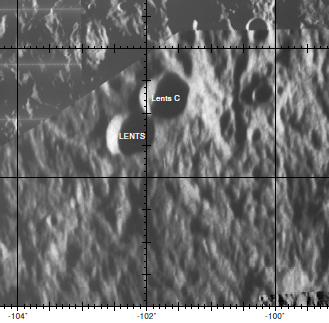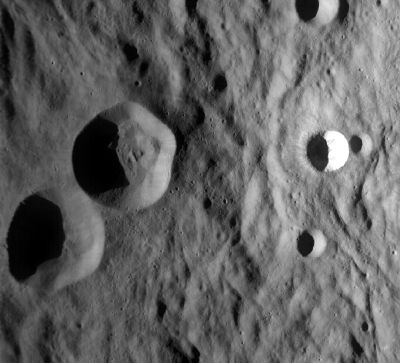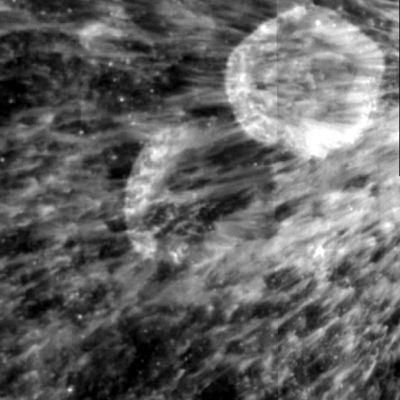Difference between revisions of "Lents (Lenz)"
| (2 intermediate revisions by the same user not shown) | |||
| Line 5: | Line 5: | ||
|- | |- | ||
| | | | ||
| − | [http://www.lpod.org/coppermine/displayimage.php?pid=4957&fullsize=1 [[Image: | + | [http://www.lpod.org/coppermine/displayimage.php?pid=4957&fullsize=1 [[Image:Normal_lents.jpg|external image normal_lents.jpg]]]<br /> |
| | | | ||
| − | [http://www.lpod.org/coppermine/displayimage.php?pid=1334&fullsize=1 [[Image: | + | [http://www.lpod.org/coppermine/displayimage.php?pid=1334&fullsize=1 [[Image:Normal_lents-clem1.jpg|external image normal_lents-clem1.jpg]]]<br /> |
|} | |} | ||
'''Left:''' ''[http://lroc.sese.asu.edu/index.html LROC]'' image WAC No. [http://wms.lroc.asu.edu/lroc/view_lroc/LRO-L-LROC-2-EDR-V1.0/M118159663ME M118159663ME]. '''Lents''' is the leftmost crater of the pair - next to '''Lents C''' (also note the rayed crater '''Pierazzo''' east of '''Lents C''', that Danny Caes gives mention to below). Calibrated by [http://ltvt.wikispaces.com/Utility%20Programs#WAC_Viewer LROC_WAC_Previewer].<br /> '''Right:''' ''[http://lpod.org/coppermine/displayimage.php?pos=-1334 Clementine]''<br /> <br /> <div id="toc"> | '''Left:''' ''[http://lroc.sese.asu.edu/index.html LROC]'' image WAC No. [http://wms.lroc.asu.edu/lroc/view_lroc/LRO-L-LROC-2-EDR-V1.0/M118159663ME M118159663ME]. '''Lents''' is the leftmost crater of the pair - next to '''Lents C''' (also note the rayed crater '''Pierazzo''' east of '''Lents C''', that Danny Caes gives mention to below). Calibrated by [http://ltvt.wikispaces.com/Utility%20Programs#WAC_Viewer LROC_WAC_Previewer].<br /> '''Right:''' ''[http://lpod.org/coppermine/displayimage.php?pos=-1334 Clementine]''<br /> <br /> <div id="toc"> | ||
| − | + | ||
| − | |||
==Images== | ==Images== | ||
[http://www.lpod.org/coppermine/thumbnails.php?album=search&type=full&search=Lents LPOD Photo Gallery] [http://www.lpi.usra.edu/resources/lunar_orbiter/bin/srch_nam.shtml?Lents%7C0 Lunar Orbiter Images] (see [http://www.lpi.usra.edu/resources/lunar_orbiter/bin/srch_nam.shtml?Lenz%7C0 Lenz]).<br /> The eastern sunlit inner slopes of '''Lenz''', '''Lenz C''', and nearby '''Pierazzo''' were captured near the lower margins of Lunar Orbiter V photographs [http://www.lpi.usra.edu/resources/lunarorbiter/images/print/5013_h2.jpg 5013-h2], [http://www.lpi.usra.edu/resources/lunarorbiter/images/print/5014_h2.jpg 5014-h2], [http://www.lpi.usra.edu/resources/lunarorbiter/images/print/5015_h2.jpg 5015-h2], [http://www.lpi.usra.edu/resources/lunarorbiter/images/print/5016_h2.jpg 5016-h2], [http://www.lpi.usra.edu/resources/lunarorbiter/images/print/5017_h2.jpg 5017-h2], [http://www.lpi.usra.edu/resources/lunarorbiter/images/print/5018_h2.jpg 5018-h2], [http://www.lpi.usra.edu/resources/lunarorbiter/images/print/5019_h2.jpg 5019-h2], and [http://www.lpi.usra.edu/resources/lunarorbiter/images/print/5020_h2.jpg 5020-h2].<br /> Research Danny Caes<br /> <br /> | [http://www.lpod.org/coppermine/thumbnails.php?album=search&type=full&search=Lents LPOD Photo Gallery] [http://www.lpi.usra.edu/resources/lunar_orbiter/bin/srch_nam.shtml?Lents%7C0 Lunar Orbiter Images] (see [http://www.lpi.usra.edu/resources/lunar_orbiter/bin/srch_nam.shtml?Lenz%7C0 Lenz]).<br /> The eastern sunlit inner slopes of '''Lenz''', '''Lenz C''', and nearby '''Pierazzo''' were captured near the lower margins of Lunar Orbiter V photographs [http://www.lpi.usra.edu/resources/lunarorbiter/images/print/5013_h2.jpg 5013-h2], [http://www.lpi.usra.edu/resources/lunarorbiter/images/print/5014_h2.jpg 5014-h2], [http://www.lpi.usra.edu/resources/lunarorbiter/images/print/5015_h2.jpg 5015-h2], [http://www.lpi.usra.edu/resources/lunarorbiter/images/print/5016_h2.jpg 5016-h2], [http://www.lpi.usra.edu/resources/lunarorbiter/images/print/5017_h2.jpg 5017-h2], [http://www.lpi.usra.edu/resources/lunarorbiter/images/print/5018_h2.jpg 5018-h2], [http://www.lpi.usra.edu/resources/lunarorbiter/images/print/5019_h2.jpg 5019-h2], and [http://www.lpi.usra.edu/resources/lunarorbiter/images/print/5020_h2.jpg 5020-h2].<br /> Research Danny Caes<br /> <br /> | ||
==Maps== | ==Maps== | ||
| − | ''([ | + | ''([[LAC%20zone|LAC zone]] 72D3)'' [http://planetarynames.wr.usgs.gov/images/Lunar/lac_72.pdf USGS Digital Atlas PDF]<br /> <br /> |
==Description== | ==Description== | ||
<br /> | <br /> | ||
| Line 22: | Line 21: | ||
==Additional Information== | ==Additional Information== | ||
* IAU page: [http://planetarynames.wr.usgs.gov/Feature/3348 Lents (Lenz)] | * IAU page: [http://planetarynames.wr.usgs.gov/Feature/3348 Lents (Lenz)] | ||
| − | * Near '''Lenz''', east-northeast of it, at 3°10' North/ 100° West, is the most beautiful raycrater of the entire moon's surface ([http://the-moon.us/wiki/Pierazzo Pierazzo]). Part of '''Pierazzo''''s ray-system is seen on the ''Clementine'' photo above. The ''Lunar Photo of the Day'' (LPOD) of december the 12th, 2007, shows a wonderful image of it, made by the Chinese probe ''Chang'e''. During the manned lunar missions of project Apollo, this exceptionally beautiful raycrater was never photographed, because it was never illuminated by the sun or by Earthshine. In fact, all the regions behind the moon's western limb (as seen from Earth) were never illuminated by the sun. We could call this part of the moon (the '''Hertzsprung''' area and environs) "''Apollo's dark part of the moon''". <span class="membersnap">- | + | * Near '''Lenz''', east-northeast of it, at 3°10' North/ 100° West, is the most beautiful raycrater of the entire moon's surface ([http://the-moon.us/wiki/Pierazzo Pierazzo]). Part of '''Pierazzo''''s ray-system is seen on the ''Clementine'' photo above. The ''Lunar Photo of the Day'' (LPOD) of december the 12th, 2007, shows a wonderful image of it, made by the Chinese probe ''Chang'e''. During the manned lunar missions of project Apollo, this exceptionally beautiful raycrater was never photographed, because it was never illuminated by the sun or by Earthshine. In fact, all the regions behind the moon's western limb (as seen from Earth) were never illuminated by the sun. We could call this part of the moon (the '''Hertzsprung''' area and environs) "''Apollo's dark part of the moon''". <span class="membersnap">- DannyCaes <small>Jan 6, 2008</small></span> |
<br /> | <br /> | ||
==Nomenclature== | ==Nomenclature== | ||
| Line 33: | Line 32: | ||
[http://www2.lpod.org/wiki/December_12,_2007 The bright ray craterlet near Lenz, photographed by Chang'e].<br /> <br /> | [http://www2.lpod.org/wiki/December_12,_2007 The bright ray craterlet near Lenz, photographed by Chang'e].<br /> <br /> | ||
==Lettered craters== | ==Lettered craters== | ||
| − | [[Image: | + | [[Image:Lents-letter.jpg|lents-letter.jpg]]<br /> [http://planetarynames.wr.usgs.gov/images/Lunar/lac_72_lo.pdf LAC 72]. Excerpt from the ''[http://planetarynames.wr.usgs.gov/dAtlas.html USGS Digital Atlas of the Moon]''.<br /> <br /> |
==Bibliography== | ==Bibliography== | ||
<br /> <br /> | <br /> <br /> | ||
---- | ---- | ||
| − | [ | + | [[Alphabetical%20Index|Named Features]] -- Prev: [[Lacus%20Lenitatis|Lacus Lenitatis]] -- Next: [[Leonid|Leonid]]<br /> |
---- | ---- | ||
| − | + | </div> | |
Latest revision as of 02:01, 16 April 2018
Contents
Lents (Lenz)
| Lat: 2.72°N, Long: 102.3°W, Diam: 21.98 km, Depth: km, Rükl: (farside) | |
Right: Clementine
Images
LPOD Photo Gallery Lunar Orbiter Images (see Lenz).
The eastern sunlit inner slopes of Lenz, Lenz C, and nearby Pierazzo were captured near the lower margins of Lunar Orbiter V photographs 5013-h2, 5014-h2, 5015-h2, 5016-h2, 5017-h2, 5018-h2, 5019-h2, and 5020-h2.
Research Danny Caes
Maps
(LAC zone 72D3) USGS Digital Atlas PDF
Description
Wikipedia
Additional Information
- IAU page: Lents (Lenz)
- Near Lenz, east-northeast of it, at 3°10' North/ 100° West, is the most beautiful raycrater of the entire moon's surface (Pierazzo). Part of Pierazzo's ray-system is seen on the Clementine photo above. The Lunar Photo of the Day (LPOD) of december the 12th, 2007, shows a wonderful image of it, made by the Chinese probe Chang'e. During the manned lunar missions of project Apollo, this exceptionally beautiful raycrater was never photographed, because it was never illuminated by the sun or by Earthshine. In fact, all the regions behind the moon's western limb (as seen from Earth) were never illuminated by the sun. We could call this part of the moon (the Hertzsprung area and environs) "Apollo's dark part of the moon". - DannyCaes Jan 6, 2008
Nomenclature
- Named for Heinrich Friedrich Emil Lenz (February 12, 1804 - February 10, 1865), a Baltic German physicist most famous for formulating Lenz's law in 1833. He began studying electromagnetism in 1831. Besides the law named in his honor, Lenz also independently discovered Joule's law in 1842; to honor his efforts on the problem, Russian physicists always use "Joule-Lenz law" as the name.
- This name was approved by the IAU (as Lenz) in Menzel, 1971.
- The spelling has changed as a result of changes in the way the Cyrillic characters are transliterated. The older spelling in parenthesis is probably to be ignored but the IAU has never adopted a clear or consistent position on this.
LPOD Articles
The bright ray craterlet near Lenz, photographed by Chang'e.
Lettered craters

LAC 72. Excerpt from the USGS Digital Atlas of the Moon.
Bibliography
Named Features -- Prev: Lacus Lenitatis -- Next: Leonid

